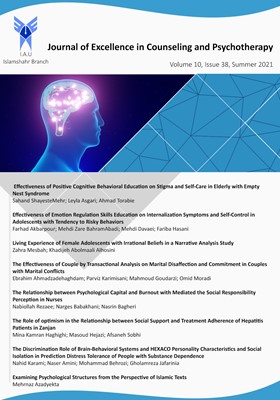Living Experience of Female Adolescents with Irrational Beliefs in a Narrative Analysis Study
Subject Areas : Journal of Excellence in Counseling and PsychotherapyZahra Mesbah 1 , Khadijeh Abolmaali Alhosini 2
1 - PhD Student, Department of Psychology, Roudehen Branch, Islamic Azad University, Roudehen, Iran.
2 - Associate Professor, Department of Psychology, Roudehen Branch, Islamic Azad University, Roudehen, Iran
Keywords: Adolescent girls, Irrational beliefs, narrative analysis,
Abstract :
Purpose: The present study examines the lived experience of female adolescents with irrational beliefs in order to determine the common and underlying factors for the development of irrational beliefs in the cognitive distortions of female adolescents. Methodology: The present qualitative research was phenomenology in the interpretive paradigm with the method of narrative analysis with the model of pluralistic analysis. The statistical population was the female students of the second year of high school in the 2nd and 5th districts of Tehran in the academic year 2019-2020. 274 students completed the Bernard (1988) Adolescent Irrational Beliefs Questionnaire, of which 16 were selected based on the inclusion criteria and purposefully due to having a score of 1.5 units of standard deviation above average. Then 12 people were studied until they reached theoretical saturation. Data collection was by semi-structured interview with McAdams. Formal-content and critical interpretive perspectives were used to analyze the data. Findings: The research findings after the coding process showed conceptual commonalities among adolescents with irrational beliefs in 5 main themes and 9 sub-themes. These adolescents had five common characteristics: low self-efficacy, poor communication skills with others and inappropriate communication with God, dysfunctional parent-child relationship pattern, and traumatic childhood problems. Conclusion: In the treatment interventions of these adolescents to reduce irrational beliefs, the role of weakness in communication skills and self-efficacy, communication with God can be paid more attention, and in preventive interventions, harmful childhood problems such as rejection and emotional deprivation and the role of dysfunctional parenting style. He considered irrational beliefs in order to move more confidently to educate and improve adolescents' mental health.
_||_


